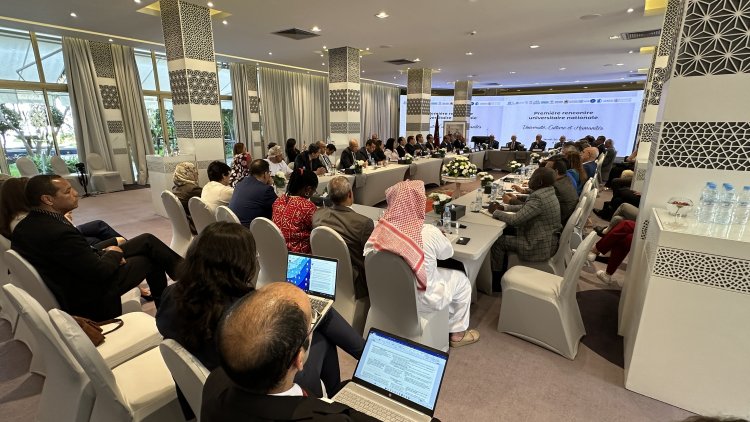Inaugural National University Meeting at Mohammed V University: A New Dawn for Moroccan Education

On June 20th, 2024, the prestigious Tour Hassan Palace in Rabat played host to a landmark event in the landscape of Moroccan higher education—the inaugural National University Meeting, organized by Mohammed V University. The event brought together some of the most influential figures in Moroccan education and culture, marking a significant milestone in the nation's academic evolution.
The gathering was graced by the presence of the advisor to His Majesty King Mohammed VI, the Minister of Higher Education, Scientific Research, and Innovation, and the Minister of Youth, Culture, and Communication. Their participation underscored the importance of this event, setting the tone for a day filled with insightful discussions and forward-looking perspectives.
Exploring Academic Research and Innovation
One of the central themes of the meeting was the pivotal role of academic research in driving innovation and development in Morocco. The speakers highlighted the need for robust research frameworks that can address the pressing challenges faced by society today. Emphasizing a culture of inquiry and critical thinking, the discussion underscored the importance of fostering a research-driven academic environment that can contribute to the nation's socio-economic growth.
Enhancing Soft Skills for the Modern World
In addition to academic rigor, the meeting also focused on the development of soft skills among students. These skills, which include communication, teamwork, and problem-solving, are essential for the holistic development of individuals and their success in the modern workforce. The panelists stressed the need for universities to integrate soft skills training into their curricula, ensuring that graduates are not only knowledgeable in their fields but also equipped to navigate the complexities of the professional world.
Multilingual Proficiency as a Global Asset
Languages were another key topic of discussion, with a particular emphasis on the benefits of multilingualism. In a globalized world, the ability to communicate in multiple languages is a valuable asset that can open doors to numerous opportunities. The speakers advocated for enhanced language education in Moroccan universities, aiming to produce graduates who are proficient in several languages and capable of engaging with diverse cultures and perspectives.
Supporting Marginalized Students through Funding
A crucial issue addressed at the meeting was the need for better funding mechanisms to support students from marginalized backgrounds. Ensuring equitable access to education for all segments of society is vital for fostering social inclusion and mobility. The discussions highlighted various strategies to increase financial aid and scholarships for underprivileged students, enabling them to pursue higher education without the burden of financial constraints.
Promoting Inclusion of International Students
Inclusion, particularly of international students, was another significant focus. The panelists discussed the benefits of creating a more inclusive and diverse academic environment by attracting students from different parts of the world. Such inclusion not only enriches the educational experience but also promotes cross-cultural understanding and cooperation. The meeting underscored the need for policies and practices that support the integration and success of international students in Moroccan universities.
Encouraging Extracurricular Activities and Clubs
The importance of extracurricular activities and student clubs in fostering a well-rounded educational experience was also highlighted. These activities provide students with opportunities to develop leadership skills, pursue their passions, and build a sense of community. The discussions emphasized the need for universities to support and promote a vibrant extracurricular scene, which can enhance student engagement and personal development.
The Culture of Research and Museums
The meeting also delved into the role of universities in promoting a culture of research and the significance of museums as educational resources. Universities were encouraged to collaborate with museums to create rich, research-based learning experiences. This collaboration can help preserve and promote cultural heritage while providing students with unique opportunities to engage in hands-on learning and exploration.
Socioeconomic Inclusion and Equality
Socioeconomic inclusion was a recurring theme throughout the event. The speakers highlighted the critical role of universities in promoting equality and providing opportunities for all members of society to succeed. The discussions called for more inclusive policies that address the diverse needs of students from various socioeconomic backgrounds, ensuring that higher education remains accessible and beneficial for everyone.
Capitalizing on Morocco's Academic Legacy
Morocco's rich academic legacy, including the establishment of the world's first university in Fez, was celebrated as a source of pride and inspiration. The meeting emphasized the need to build on this legacy, leveraging Morocco's historical contributions to education to shape a bright future for its universities. This heritage serves as a reminder of the nation's long-standing commitment to learning and knowledge, providing a strong foundation for future advancements.
Challenging Distorted Narratives through Education
Finally, the meeting addressed the role of universities in correcting distorted narratives perpetuated by media and social media. In an era of misinformation, universities have a crucial responsibility to promote accurate knowledge and critical thinking. The discussions highlighted the importance of academic institutions in fostering an informed and discerning public, capable of challenging falsehoods and contributing to a more truthful and just society.
Conclusion: A Vision for the Future
The inaugural National University Meeting at Mohammed VI University was a resounding success, setting the stage for a new era in Moroccan higher education. The event showcased the collective commitment of educators, policymakers, and leaders to advancing the nation's academic landscape. By addressing critical issues such as academic research, soft skills, language proficiency, funding, inclusion, and more, the meeting charted a course for a more inclusive, innovative, and impactful educational system.
As Morocco continues to build on its rich academic heritage and embrace the challenges of the modern world, the insights and strategies discussed at this meeting will undoubtedly play a vital role in shaping the future of its universities and their contributions to society.
An article by Lamiae Abouzid, PhD candidate and lecturer at USMBA Fez






























